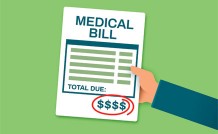Online Class: HIPAA Compliance 101

no certificate
with CEU Certificate*
-
12Lessons
-
17Exams &
Assignments -
2,479Students
have taken this course -
6Hours
average time -
0.6CEUs
Course Description
In this course, you will gain a thorough understanding of HIPAA--the "Health Insurance Portability and Accountability Act". Included are modules explaining the legislative origin of HIPAA, which providers are covered under the act, as well as the steps necessary to protect patient information and request disclosures.
HIPAA was the result of mounting concerns regarding patient access to insurance during unstable times, as well as concerns regarding the mass collection and storage of highly sensitive personal information by health insurance companies and medical establishments. HIPAA is divided into two components, Title 1 and Title 2.
Title 1: Health Coverage Access and Portability
The focus of Title 1 is on the portability of health coverage. This protects an individual's ability to maintain health coverage even when moving between jobs, and is especially important in the case of pre-existing conditions.
In the past, many employers denied health coverage to new employees if they could verify the existence of a pre-existing condition. Due to this, many people were afraid to leave their jobs, even if the work environment and compensation were poor. The risk of being unable to acquire health insurance for themselves and their families was one that few people were willing to take, especially in uncertain economic times.
According to the United States Department of Labor, HIPAA is a federal law that:
- Limits the ability of a new employer plan to exclude coverage for pre-existing conditions
- Provides additional opportunities to enroll in a group health plan if you lose other coverage, or experience certain life events
- Prohibits discrimination against employees and their dependent family members based on any health factors they may have, including prior medical conditions, previous claims experience, and genetic information
- Guarantees that certain individuals will have access to, and can renew, individual health insurance policies.
Title 2: Developing the Administrative Simplification Provisions
The focus of Title 2, also known as the "Administrative Simplification"provisions, is to protect unique identifying information found in patient health records, insurance claims and many other types of health documents. Title 2 also encourages the use of electronic patient records systems and imposes penalties for breaches of patient privacy.
When the act was initially drafted, there was a mandate for the Administrative Simplification rules to be developed and ratified by Congress and publicized by the Secretary of the Department of Health and Human Services to the public within three years. In the absence of action by Congress, the Secretary of HHS was to take responsibility for drafting the legislation. As Congress failed to move on this initiative, the Secretary of HHS took over.
The Secretary created proposed legislation that governed the exchange, privacy, and security of personal health information. This proposal was released to the public for feedback and amended based on more than 52,000 comments that were received. The final version was released in December of 2000. The legislation was later revised and again vetted by the public, with the final version released in August of 2002.
The First Federal Medical Privacy Data Legislation
There were privacy laws on the books in the individual states, but they mainly focused on financial data, identity theft, and other types of fraud. The laws that dealt with medical information were not robust or clear enough to eliminate the many breaches of privacy that had occurred, or could occur. HIPAA provided a blanket set of expectations for medical data privacy that provided more security for patients and uniform direction for those who deal with medical data. The fact that the law included civil and criminal penalties also gave it more credibility.
Prior to the inception of HIPAA's privacy rule, there was a sense of organized chaos in the medical community. Clinics were burdened with increased administrative duties required by managed care companies, which included keeping up to date on procedure codes, billing requirements, and record maintenance. Also, there was no standard format for the establishments that maintained electronic patient records. One of the main goals of HIPAA was to streamline the process for maintaining and transmitting patient data electronically while limiting breaches in confidentiality.
The main benefits of the Standards for Privacy of Individually Identifiable Health Information ("Privacy Rule") are:
- Specific rules regarding the disclosure of Protected Health Information (PHI)
- Guidelines for transmitting patient data electronically
- Limiting internal employee access to PHI to the minimum necessary to perform their jobs
- Guidelines for health insurance companies and clearing houses that transmit PHI
- The ability for patients to access their medical records and make amendments to their medical data if warranted
- To require authorization from the individual to utilize or transmit PHI as part of any marketing communications
The privacy rule has gone through a few iterations. The original version was released in December of 2000. The privacy rule was later amended in August of 2002, and required compliance by February 14, 2003. Smaller health plans with fewer resources were required to be in compliance by April 14, 2004.
- Completely Online
- Self-Paced
- Printable Lessons
- Full HD Video

- 6 Months to Complete
- 24/7 Availability
- Start Anytime
- PC & Mac Compatible
- Android & iOS Friendly
- Accredited CEUs

Course Lessons
Lesson 1: HIPAA Policy Background
 Lesson 1 Video
Lesson 1 Video Lesson discussions: Poll 2 ~ Lesson 1; Poll 1 ~ Lesson 1; Poll 3 ~ Lesson 3; Reasons for Taking this Course
Lesson discussions: Poll 2 ~ Lesson 1; Poll 1 ~ Lesson 1; Poll 3 ~ Lesson 3; Reasons for Taking this Course Complete: Lesson 1 Assignment
Complete: Lesson 1 Assignment Assessment: Lesson 1 Exam
Assessment: Lesson 1 Exam
Lesson 2: Covered Entities Under HIPAA
 Lesson 2 Video
Lesson 2 Video Complete: Lesson 2 Assignment
Complete: Lesson 2 Assignment Assessment: Lesson 2 Exam
Assessment: Lesson 2 Exam
Lesson 3: What Is Protected Health Information?
 Lesson 3 Video
Lesson 3 Video Assessment: Lesson 3 Exam
Assessment: Lesson 3 Exam
Lesson 4: Sharing PHI Without Patient Notification
 Lesson 4 Video
Lesson 4 Video Assessment: Lesson 4 Exam
Assessment: Lesson 4 Exam
Lesson 5: Obtaining Patient Authorization
 Lesson 5 Video
Lesson 5 Video Complete: Lesson 5 Assignment
Complete: Lesson 5 Assignment Assessment: Lesson 5 Exam
Assessment: Lesson 5 Exam
Lesson 6: Understanding "Minimum Necessary"
 Lesson 6 Video
Lesson 6 Video Assessment: Lesson 6 Exam
Assessment: Lesson 6 Exam
Lesson 7: Publicizing HIPAA Compliance and Informing Patients
 Lesson 7 Video
Lesson 7 Video Complete: Lesson 7 Assignment
Complete: Lesson 7 Assignment Assessment: Lesson 7 Exam
Assessment: Lesson 7 Exam
Lesson 8: Patient Rights and Access to PHI
 Lesson 8 Video
Lesson 8 Video Lesson discussions: Poll 1 ~ Lesson 8
Lesson discussions: Poll 1 ~ Lesson 8 Assessment: Lesson 8 Exam
Assessment: Lesson 8 Exam
Lesson 9: Administrative Requirements of Adhering to HIPAA
 Lesson 9 Video
Lesson 9 Video Assessment: Lesson 9 Exam
Assessment: Lesson 9 Exam
Lesson 10: HIPAA's Administrative Simplification Regulations
 Lesson 10 Video
Lesson 10 Video Lesson discussions: Poll 1 ~ Lesson 10
Lesson discussions: Poll 1 ~ Lesson 10 Assessment: Lesson 10 Exam
Assessment: Lesson 10 Exam
Lesson 11: Enforcement and Penalties
 Lesson 11 Video
Lesson 11 Video Assessment: Lesson 11 Exam
Assessment: Lesson 11 Exam
Lesson 12: HIPAA in Action
 Lesson 12 Video
Lesson 12 Video Lesson discussions: Poll 1 ~ Lesson 12; Program Evaluation Follow-up Survey (End of Course); Course Comments
Lesson discussions: Poll 1 ~ Lesson 12; Program Evaluation Follow-up Survey (End of Course); Course Comments Assessment: Lesson 12 Exam
Assessment: Lesson 12 Exam Assessment: The Final Exam
Assessment: The Final Exam
Learning Outcomes
- Summarize HIPAA policy background.
- Identify covered entities under HIPAA.
- Describe what is protected health information.
- Summarize sharing PHI without patient notification.
- Describe obtaining patient authorization.
- Describe publicizing HIPAA compliance and informing patients.
- Recognize patient rights and access to PHI.
- Summarize administrative requirements of adhering to HIPAA.
- Identify enforcement and penalties of HIPAA.
- Demonstrate mastery of lesson content at levels of 70% or higher.
Additional Course Information

- Document Your Lifelong Learning Achievements
- Earn an Official Certificate Documenting Course Hours and CEUs
- Verify Your Certificate with a Unique Serial Number Online
- View and Share Your Certificate Online or Download/Print as PDF
- Display Your Certificate on Your Resume and Promote Your Achievements Using Social Media

Choose Your Subscription Plan
No Certificate / No CEUs
This course only
| Includes certificate | X |
| Includes CEUs | X |
| Self-paced |

|
| Instructor support |

|
| Time to complete | 6 months |
| No. of courses | 1 course |
Certificate & CEUs
This course only
| Includes certificate |

|
| Includes CEUs |

|
| Self-paced |

|
| Instructor support |

|
| Time to complete | 6 months |
| No. of courses | 1 course |
Certificates & CEUs
Includes all 600+ courses
| Includes certificate |

|
| Includes CEUs |

|
| Self-paced |

|
| Instructor support |

|
| Time to complete | 12 Months |
| No. of courses | 600+ |
Certificates & CEUs
Includes all 600+ courses
| Includes certificate |

|
| Includes CEUs |

|
| Self-paced |

|
| Instructor support |

|
| Time to complete | 24 Months |
| No. of courses | 600+ |
Student Testimonials
- "All good" -- Kyle B.
- "Instructor was very quick to respond." -- Lynn E.
- "Good job. I also liked the extra resources offered with the course material." -- Shannon N.
- "It was great having an instructor with the CPC designation. It gave me confidence that this course is necessary. The written assignments forced me to pay attention to the detail of what I was reading and the exams reinforced my learning of the information." -- Carolyn D.
- "Thank you. The whole class was helpful." -- Diane L.
- "[Instructor] responded to all of my emails and helped me to understand the reasoning for each correct answer." -- Palmyra S.
- "Course was very informative and not terribly difficult I was worried I would struggle with it but I did not. Instructor was on top of the work never took her very long to grade things. I found the videos extra helpful because I would read the material and then watch them and it helps me get all the info thoroughly down pat." -- Josie F.
- "The way HIPAA was broken down into digestible chunks was very helpful." -- Charles F.
Related Courses
-
 74 hours
7.4 CEUs
Medical Billing and Coding Course Bundle
$175.00
74 hours
7.4 CEUs
Medical Billing and Coding Course Bundle
$175.00
-
 17 hours
1.7 CEUs
Medical Terminology 201
$95.00
17 hours
1.7 CEUs
Medical Terminology 201
$95.00
-
 2 hours
0.2 CEUs
Careers in Healthcare
$95.00
2 hours
0.2 CEUs
Careers in Healthcare
$95.00
-
 20 hours
2.0 CEUs
Introduction to Medical Coding
$154.00
20 hours
2.0 CEUs
Introduction to Medical Coding
$154.00
-
 5 hours
0.5 CEUs
End of Life Care
$95.00
5 hours
0.5 CEUs
End of Life Care
$95.00
-
 6 hours
0.6 CEUs
HIPAA Compliance 101
$95.00
6 hours
0.6 CEUs
HIPAA Compliance 101
$95.00
-
 7 hours
0.7 CEUs
Alzheimer's Disease 101
$95.00
7 hours
0.7 CEUs
Alzheimer's Disease 101
$95.00
-
 17 hours
1.7 CEUs
ICD-10: Medical Coding
$140.00
17 hours
1.7 CEUs
ICD-10: Medical Coding
$140.00
-
 30 hours
3.0 CEUs
Microbiology 101
$110.00
30 hours
3.0 CEUs
Microbiology 101
$110.00
-
 6 hours
0.6 CEUs
Advocacy for Elderly Patients
$95.00
6 hours
0.6 CEUs
Advocacy for Elderly Patients
$95.00
-
 4 hours
0.4 CEUs
Asthma 101
$95.00
4 hours
0.4 CEUs
Asthma 101
$95.00
-
 8 hours
0.8 CEUs
Medical Office Administrative Operations
$95.00
8 hours
0.8 CEUs
Medical Office Administrative Operations
$95.00
-
 10 hours
1.0 CEUs
Healthcare Code and Conduct
$95.00
10 hours
1.0 CEUs
Healthcare Code and Conduct
$95.00
-
 18 hours
1.8 CEUs
Medical Terminology 101
$75.00
18 hours
1.8 CEUs
Medical Terminology 101
$75.00
-
 10 hours
1.0 CEUs
Understanding Addictions
$95.00
10 hours
1.0 CEUs
Understanding Addictions
$95.00
-
 4 hours
0.4 CEUs
Diabetes 101
$95.00
4 hours
0.4 CEUs
Diabetes 101
$95.00
-
 5 hours
0.5 CEUs
Aging and Long Term Care 101
$95.00
5 hours
0.5 CEUs
Aging and Long Term Care 101
$95.00
-
 7 hours
0.7 CEUs
Concussions 101
$95.00
7 hours
0.7 CEUs
Concussions 101
$95.00
-
 7 hours
0.7 CEUs
Caring for Seniors
$95.00
7 hours
0.7 CEUs
Caring for Seniors
$95.00
-
 5 hours
0.5 CEUs
HIV: Prevention, Diagnosis, Treatment
$95.00
5 hours
0.5 CEUs
HIV: Prevention, Diagnosis, Treatment
$95.00
-
 14 hours
1.4 CEUs
Medical Terminology for Medical Coders
$115.00
14 hours
1.4 CEUs
Medical Terminology for Medical Coders
$115.00









